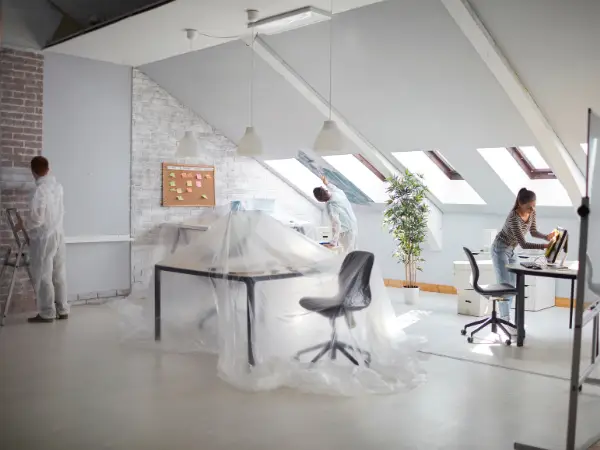Understand What Affects Office Renovation Costs
Before you start planning your office renovation, it is important to know what drives the cost of the project. Renovations vary depending on the size of your space, the type of work needed, and the quality of finishes you choose. By understanding these cost drivers, you can make better decisions and avoid overspending.
Main factors that affect your renovation costs:
Size of your office space
Larger spaces need more materials, labour, and time.Scope of work
Structural changes cost more than cosmetic upgrades. Moving walls, changing layouts, and altering plumbing or electrical systems increase costs.Design specifications
High-end finishes, custom joinery, and specialist lighting are more expensive than standard materials.Building condition
Older buildings often need additional repairs or upgrades to meet current safety and compliance requirements.Building regulations and compliance
Your office must meet local health and safety regulations. Compliance work adds to your budget.Project timeline
Fast-tracked projects can cost more due to overtime or increased labour costs.
Typical Cost Categories in an Office Renovation
Breaking your budget into categories helps you plan more accurately and compare contractor quotes effectively. These are the core cost categories for most office renovations:
1. Design and Planning
This includes concept design, space planning, layout drawings, and project documentation.
You will need these before contractors can provide accurate pricing.
Estimated cost: 5–10% of total project cost.
2. Demolition and Strip-Out
Removing old fittings, flooring, ceilings, partitions, and services is often the first step.
This also includes safe disposal of materials and site preparation.
Estimated cost: R300–R600 per square metre.
3. Construction and Partitioning
This covers building new walls, doors, windows, and any structural changes.
Lightweight drywall partitions are cheaper than brick or glass walls.
Estimated cost: R700–R1,200 per square metre depending on materials.
4. Electrical and Lighting
Electrical work includes wiring, plug points, light fittings, and distribution boards.
Lighting design can impact productivity, so plan this carefully.
Estimated cost: R500–R1,000 per square metre.
5. Plumbing
Plumbing covers kitchenettes, bathrooms, and water points.
Renovating existing services is usually cheaper than relocating them.
Estimated cost: R10,000–R20,000 per point.
6. Flooring
Flooring options range from carpet tiles and vinyl to timber and tiles.
Choose durable finishes that match your foot traffic levels.
Estimated cost: R300–R900 per square metre.
7. Ceilings
Suspended ceilings, bulkheads, and acoustic panels are common in office renovations.
They hide services and improve acoustics.
Estimated cost: R250–R600 per square metre.
8. Air Conditioning and Ventilation
Your office must maintain good air quality and temperature.
Upgrades or replacements can carry significant costs.
Estimated cost: R1,000–R2,500 per square metre.
9. Painting and Decorating
Painting walls, doors, and trims is part of the final finish.
Feature walls or specialist finishes increase costs.
Estimated cost: R80–R150 per square metre.
10. Furniture and Joinery
This includes built-in storage, reception desks, kitchen units, and workstations.
Custom items cost more than off-the-shelf solutions.
Estimated cost: Varies widely based on design.
Office Renovation Costs
Setting a Realistic Budget Range
Every project is unique, but these ranges can help you plan:
Light refresh (paint, flooring, basic electrical): R3,000–R5,000 per square metre
Medium renovation (new layouts, partitions, lighting, aircon): R5,000–R8,000 per square metre
Full fit-out (full strip-out, new services, high-end finishes): R8,000–R15,000+ per square metre
Use these figures as a starting point when planning your project. Your actual costs will depend on your specific requirements and space condition.
How to Get Accurate Office Renovation Quotes
Accurate quotes are essential if you want to avoid cost overruns. Follow these steps to get clear, comparable quotes:
Define your scope clearly
Prepare a clear brief that explains your space, your requirements, and your preferred finishes.Get multiple independent quotes
Request at least three quotes from experienced contractors in Cape Town. This allows you to compare pricing, timelines, and proposed methods.Ask for itemised pricing
Detailed line-item pricing lets you see what you are paying for and identify any gaps.Review timelines and capacity
Ensure the contractors can meet your schedule and have enough resources for your project.Check references and track records
Speak to previous clients and review past projects.Review exclusions carefully
Many cost overruns come from items excluded from the original quote.
Managing Costs During the Project
Renovation costs can rise during construction if you do not control them closely. Use these steps to stay on budget:
Finalise your design early
Avoid late changes as they can disrupt schedules and increase costs.Approve all changes in writing
Document any variation to scope or pricing during the project.Track progress regularly
Hold weekly site meetings to check progress against the programme.Use a quantity surveyor for larger projects
They can verify contractor claims and manage payments.Retain a contingency allowance
Keep 10–15% of your budget aside for unexpected costs.
The Value of Comparing Multiple Quotes
Getting multiple quotes helps you make informed decisions. You can see how different contractors approach the same project and understand the cost drivers behind each price. It also creates competitive pressure, which often results in better pricing and more realistic timelines.
By working with a company like Cape Interiors, you can access a trusted network of independent contractors and suppliers. We do the work of sourcing and vetting contractors for you, and you receive up to three competitive quotes tailored to your project. You stay in control while saving time and effort.
Local Considerations for Renovations in Cape Town
Renovating offices in Cape Town comes with specific local factors you should plan for:
Building regulations
Ensure your contractor understands local council requirements and submits all necessary plans.Heritage buildings
Some buildings in the CBD are heritage-listed and need special approvals for alterations.Access and parking
Busy city areas can limit delivery access, which may affect timelines and costs.Load shedding
Plan for electrical backup solutions to avoid disruption during the project.Seasonal weather
Wet winter months can affect certain construction activities, like painting or waterproofing.
When to Start Planning Your Renovation
Start planning at least 6–12 months before your target move-in date or lease renewal. This gives you time to:
Assess your needs and prepare a clear brief
Get multiple competitive quotes
Finalise your design and budget
Secure council approvals
Allow enough time for construction and snagging
Early planning gives you more choice, better pricing, and fewer delays.
Key Takeaways
Renovating your office is a major investment. Understand the cost drivers, set a clear budget, and get multiple independent quotes from trusted local contractors. This approach gives you control over your costs and helps you complete your project on time and within budget.








